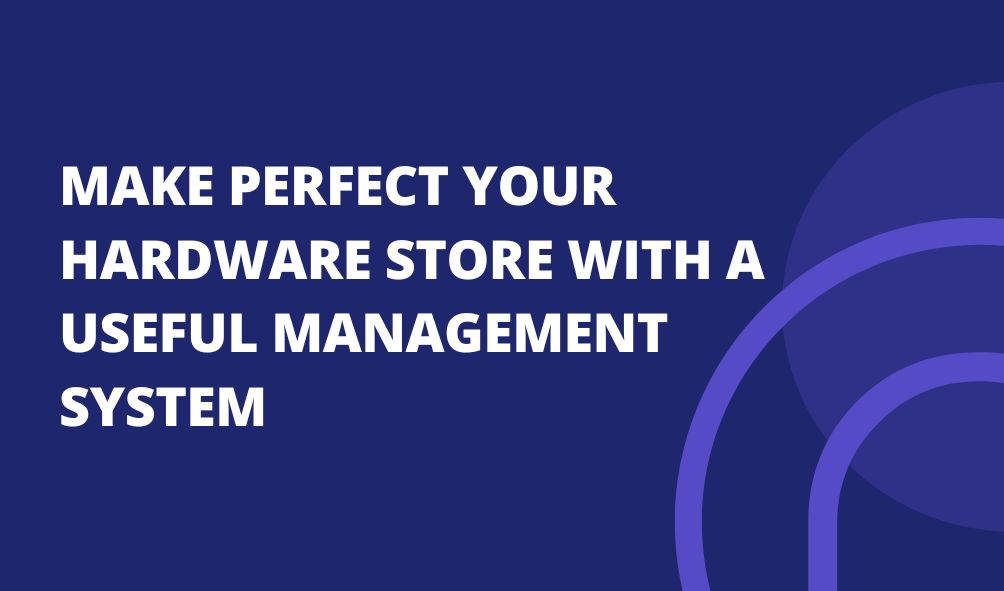The Hardware Store Management Process 2025!
Without a doubt, the store management process is a crucial part of running a successful hardware store.
But why?
The reason is simple.
Do you want to build a profitable and sustainable hardware business? Then you need an efficient system to manage inventory, sales, and customer service.
However, managing a hardware store is no easy task. The biggest challenge? Keeping track of stock levels, reducing losses, and providing smooth transactions. And that’s not all.
A poorly managed hardware store inventory management process can lead to stock shortages, overstocking, and inefficient sales operations. As a result, businesses face financial losses and customer dissatisfaction.
So, what’s the answer? How can you make managing your hardware store easier and help your business earn more money?
Don't worry!
This guide will help you with everything you need to know. It covers hardware stock management and automating sales with a POS system for your hardware store.
So, what are you waiting for? Let’s dive into this comprehensive guide designed just for YOU.
First things first, what does a store management process involve?
What is the Hardware Store Management Process?
The process of managing a hardware store circles crucial steps to ensure smooth business operations. It begins with acquiring inventory and concludes with product sales.
This involves efficient inventory management, monitoring sales, providing excellent customer service, and using automation tools to improve store functionality.
Top Benefits of a Well-Managed Hardware Store
A streamlined store management process provides several advantages:
- Better Inventory Control: Prevents stock shortages and overstocking.
- Faster Transactions: A POS system for hardware store operations speeds up the checkout process.
- Reduced Operational Costs: Automating sales and inventory management minimizes manual efforts.
- Improved Customer Satisfaction: Well-organized stock and efficient service improve the shopping experience.
- Higher Profit Margins: Optimized stock levels and competitive pricing improve profitability.
7 Key Steps in the Hardware Store Management Process
1. Procuring and Stocking Inventory
The first step in hardware store inventory management is to source products from reliable suppliers. Businesses should negotiate bulk deals to get better prices and ensure a steady supply of essential products.
Stocking should be done carefully to avoid having too much or too little. Keeping track of demand trends helps store owners maintain the right inventory levels.
A hardware stock management system can help monitor stock movements and reduce waste. Regular stock audits ensure inventory accuracy and minimize discrepancies.
2. Organizing and Categorizing Products
Once the stock arrives, it is important to manage the products efficiently. Grouping items by category, like plumbing, electrical, and construction materials, helps customers find what they need more easily.
Using barcodes or digital tracking systems helps store employees locate items quickly. High-demand products should be in easy-to-reach areas. Store layout should be changed often based on customer buying habits.
3. Inventory Tracking and Management
Keeping track of inventory is crucial for any hardware store management process. Using inventory management software helps in monitoring stock levels in real-time. This prevents running out of actual products and avoids unnecessary overstocking.
Setting up low-stock alerts ensures that businesses can reorder items before they run out. Regularly examining stock trends helps optimize purchasing decisions, reducing storage costs while maintaining product availability.
4. Pricing and Billing Process
Setting the right prices for products is key to maintaining profitability. Market research helps store owners set competitive prices while ensuring a good profit margin. Promotions and discounts can attract more customers and boost sales.
A POS system for hardware store transactions speeds up the checkout process and reduces billing errors. Multiple payment options, such as cash, credit, and digital wallets, improve customer convenience.
Having a well-structured store management process ensures smooth and accurate billing, avoiding price mismatches and unnecessary delays.
5. Customer Service and Sales Process
Providing excellent customer service helps retain customers and improve business reputation. Well-trained staff can assist customers in selecting the right products and answering their queries.
Introducing upselling and cross-selling strategies helps increase sales revenue. A smooth return and refund policy ensures customer trust.
Additionally, maintaining a purchase history allows for personalized recommendations, enhancing the shopping experience.
6. Managing Online and Offline Sales Channels
Many hardware stores now operate both offline and online. Integrating an eCommerce platform with the store's inventory system ensures seamless stock updates across all channels.
Providing options for in-store pickup and home delivery improves customer convenience. Digital marketing strategies, such as running ads and using social media, can help attract more customers.
Keeping product information updated online helps customers make informed purchase decisions.
7. Financial and Business Reporting
Tracking sales and expenses is vital to understanding a business's financial health. Generating reports on top-selling products, profit margins, and customer preferences helps in making data-driven decisions.
Automated accounting systems minimize errors and provide accurate financial insights. Monitoring seasonal sales trends allows businesses to prepare for high-demand periods and adjust stock levels accordingly.
Importance of Automation in Hardware Store Management
Using automation tools like a POS system for hardware store businesses simplifies sales and inventory management. Real-time tracking ensures stock availability and prevents losses due to mismanagement.
Automation also speeds up transactions, reduces manual errors, and improves customer service.
By integrating inventory management software, businesses can improve their hardware store inventory management process and boost overall efficiency.
Conclusion
Partner with experienced software providers and adopt innovative tools.
A well-planned store management process is essential for the smooth operation of any hardware store. From stocking products to sales transactions, every step plays a crucial role in business success.
By using good practices for managing stock in hardware stores, businesses can avoid running out of items. This helps improve sales and makes customers happier. Implementing modern tools like a POS system for hardware store operations helps streamline transactions and provide long-term growth.
Using the right tools and methods makes running a hardware store easier. This can lead to higher profits and happier customers.



